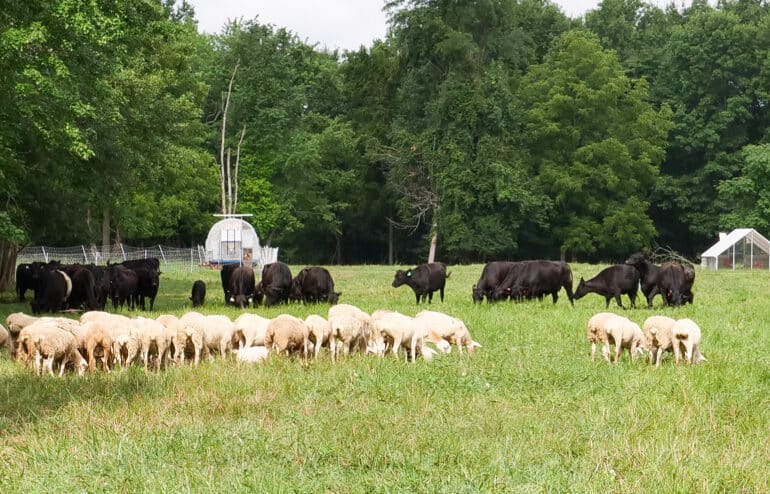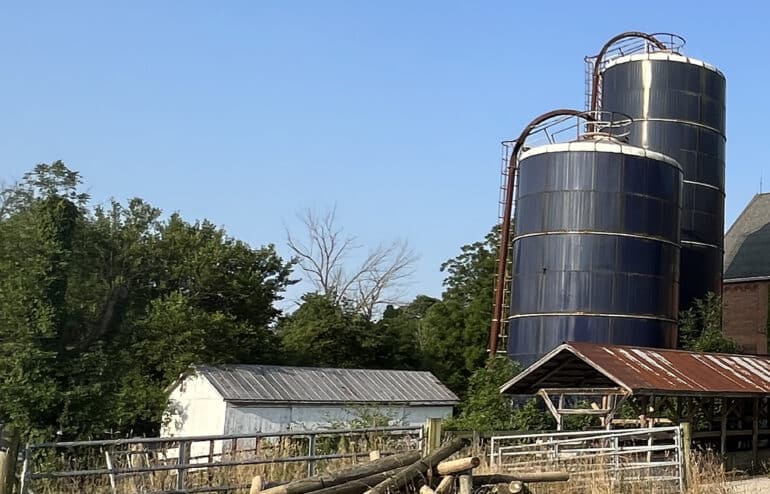
Arts and agriculture
Come together in new documentary film
Produced by Interlochen Arts Academy and Greenacres Foundation, the film will showcase the power of generative farming practices and its connection with human nutrition and the environment.
Greenacres Foundation and Interlochen Center for the Arts are proud to announce their partnership on a new film project exploring the impact of generative agriculture. The film will be produced by Interlochen Arts Academy’s Film & New Media students and will feature interviews with farmers and scientists as well as data from agricultural research conducted by Greenacres and its partners.
“It is great to have a partner to bring to life the research we’ve done,” said Greenacres President Carter Randolph, Ph.D. “Partnering with Interlochen Center for the Arts will allow us to reach a wider audience and bring attention to the importance of generative agriculture through impactful storytelling. There are so many truths in the research and science and it’s time to make it available in a format that resonates with consumers.”
“It is great to have a partner to bring to life the research we’ve done. Partnering with Interlochen Center for the Arts will allow us to reach a wider audience and bring attention to the importance of generative agriculture through impactful storytelling. There are so many truths in the research and science and it’s time to make it available in a format that resonates with consumers.”
Carter Randolph, Ph.D., Greenacres President
Interlochen Film and New Media students will do just that.
“The film aspires to tell a human, accessible story that will emotionally connect with, inspire and educate audiences, empowering them with knowledge to act,” said Interlochen Center for the Arts Director of Film and New Media Michael Mittelstaedt. “Our students will be integral to the creation of this film under the guidance of our faculty and resident artists. Their voice is an important one in these issues and this will be one of the first times their perspective is shared with the world.”
“The film aspires to tell a human, accessible story that will emotionally connect with, inspire and educate audiences, empowering them with knowledge to act. Our students will be integral to the creation of this film under the guidance of our faculty and resident artists. Their voice is an important one in these issues and this will be one of the first times their perspective is shared with the world.”
Michael Mittelstaedt, Interlochen Center for the Arts Director of Film and New Media
As part of the educational experience, Interlochen students will enroll in a new hands-on science class utilizing Interlochen’s on-campus organic farm and the RB Annis Botanical Lab. The class, entitled Biology: Regenerative Agriculture, explores the complexities of regenerative agriculture through the lens of documentary film study.
“It’s important for students to understand the philosophy and science behind regenerative agriculture. Students learn on such a deeper level when they actually get to see it in practice and actively participate in the process,” said Interlochen Director of Sustainability Emily Umbarger.
“It’s important for students to understand the philosophy and science behind regenerative agriculture. Students learn on such a deeper level when they actually get to see it in practice and actively participate in the process.”
Emily Umbarger, Interlochen Director of Sustainability
“We are thrilled to join with Greenacres Foundation to produce this film and bring broader attention to the critical benefits of regenerative agriculture,” said Interlochen Center for the Arts President Trey Devey. “This partnership provides unparalleled opportunities for our students to work across artistic disciplines, engage with professional artists, explore new facets of sustainability, and create meaningful, world-changing art.”
“We are thrilled to join with Greenacres Foundation to produce this film and bring broader attention to the critical benefits of regenerative agriculture. This partnership provides unparalleled opportunities for our students to work across artistic disciplines, engage with professional artists, explore new facets of sustainability, and create meaningful, world-changing art.”
Trey Devey, Interlochen Center for Arts President
In 2016, Interlochen’s Board of Trustees adopted a sustainability resolution, pledging to “create an environmentally friendly and sustainable campus” at Interlochen Center for the Arts. In the six years since, the organization has constructed a botanical lab and community garden; initiated campus-wide recycling and composting programs; installed water-saving appliances and restroom fixtures; established sustainability education programs for Interlochen students and members of the local community; and donated thousands of pounds of organic fruits and vegetables to the local food pantry at Redeemer Lutheran Church. In 2019, the United States Department of Education designated Interlochen Center for the Arts a Green Ribbon School in recognition of the organization’s efforts to reduce its environmental impact, improve the health and wellness of its students and staff, and provide effective environmental and sustainability education. Later this year, Interlochen will also release its first-ever formalized climate action plan, which will outline further steps toward mitigating climate change and reducing the institution’s carbon footprint.
The film is set to begin production this fall, with a goal of premiering at national film festivals. It will then be made available to the public through a streaming platform and community screenings.
About Interlochen Center for the Arts
The nonprofit Interlochen Center for the Arts is a recipient of the National Medal of Arts and the only organization in the world that brings together a 3,000-student summer camp program; a 500-student fine arts boarding high school; opportunities for hundreds of adults to engage in fulfilling artistic and creative programs; two 24-hour listener-supported public radio services (classical music and news); more than 600 arts presentations annually by students, faculty and world-renowned guest artists; and a global alumni base spanning nine decades, including leaders in the arts and all other endeavors. For information, visit Interlochen online at www.interlochen.org.
About Greenacres Foundation
Greenacres Foundation is an Ohio-based nonprofit and underwriter of the project. The foundation’s work focuses on education, conservation and generative agriculture with an emphasis on encouraging appreciation of nature by providing the public, particularly children, opportunities to study plant and animal life in their natural settings. For more information, visit Greenacres online at www.green-acres.org.



